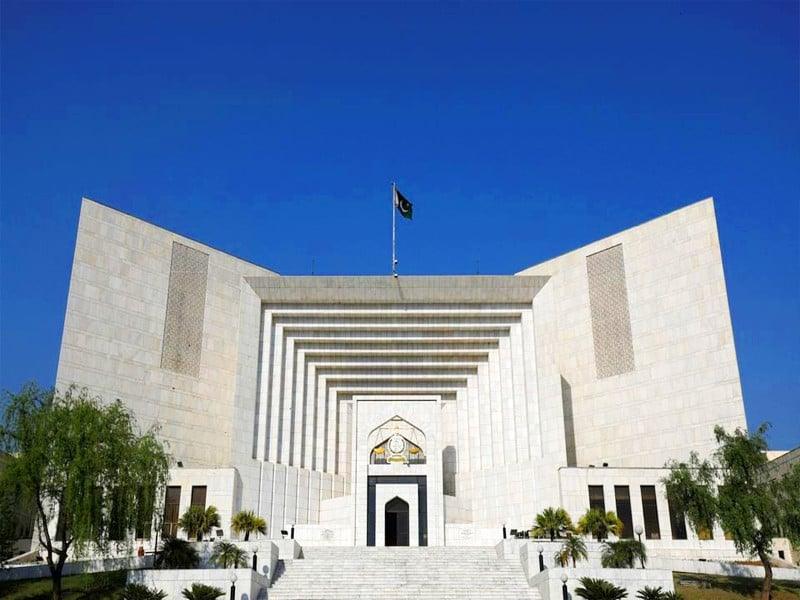Islamabad:
The Superior Court has given guidelines to the Punjab government for setting up a wastewater treatment plant (WWTP) in order to treat contaminated water flowing in the Ravi river.
Although it is well established that the development of policies falls under the domain of the executive, the court, in the exercise of its constitutional duty to protect the fundamental rights under article 9 of the Constitution, A, Over the years, developed a substantial knowledge base concerning environmental challenges.
Consequently, without encroaching on the prerogative of the preparation of executive policies, the court deems appropriate to suggest certain options that the executive authorities may consider when the formulation of its response to the dispute to be made, that is To say the delay of three decades in the implementation The WWTP, called a written judgment of seven pages written by judge Syed Mansoor Ali Shah.
The bench specified that these recommendations, although they are not binding, aim to help the executive to fulfill its obligations towards environmental protection and sustainable development.
The order indicates that the land measuring 6,937 Kanals was acquired by the Water and Sanitation Authority (WASA), an agency of Lahore Development Authority (LDA), in three places in Tehsil and the Lahore – Babu Sabu, Jhugian Nagra District and Niaz Beg – in 1991-1992 with two awards dated 24.12.1991 and 23.02.1992.
The land was acquired in public purposes of the establishment of a wastewater treatment plant (WWTP) to treat contaminated wastewater flowing in the delight.
The ordinance also indicated that at the start, WWTP should be funded by the World Bank, but negotiations did not materialize and almost three decades have passed without any progress on the ground. Wasa MD and the secretary of Punjab for Housing and Urban Development submit that new loans negotiations are currently being prosecuted with the French Development Agency (AFD). In this regard, it is argued that the PC-11 form is set up for approval before the provincial development work party (PDWP), the Central Development Working Party (CDWP) and the Executive Committee of the National Economic Council ( “Ecnec”) – Key bodies responsible for economic planning, development of infrastructure and investment in the public sector.
“It is also argued that the approval of the ECNEC is expected at the end of August 2025 and, if granted, the loan negotiations with AFD will begin in February 2026,” said the order.
Judge Shah, while giving suggestions, noted that access to climate financing is essential to ensure the adaptation and resilience of the climate, in particular in vulnerable regions such as Pakistan, where environmental deterioration directly affects fundamental rights such as life, health and dignity. In this context, climate financing appears to be a viable and autonomous alternative which is not only aligned with environmental responsibility and financial sustainability but also confirms fundamental rights under the Constitution.
The principles of Islamic finance, in particular those who focus on risk sharing and ethical investment, offer a debt -based approach to finance critical infrastructure. WASA can consider taking advantage of the WAQF (endowments), Sukuk (Islamic obligations) and public-private partnerships anchored in Islamic finance. For example, a green sukuk – a financial instrument in accordance with sharia – can be issued to collect funds specifically for the water treatment station, attracting investors who are looking for both financial yields and an environmental impact.
Islamic finance has changed the situation in climate action, offering ethical and sustainable financial solutions for the world South. Indonesia successfully launched a green Sukuk in 2018, raising $ 1.25 billion to finance renewable energy and climate resilient projects, demonstrating that Islamic financial instruments can effectively mobilize resources for environmental sustainability.
The sustainable investment and responsible for Malaysia (SRI) Sukuk, has financed water conservation initiatives, waste management and solar energy. By integrating Islamic finance into climatic strategies, especially in Muslim countries and countries vulnerable to climate like Pakistan, there is important potential to mobilize resources and improve the impact of global climatic initiatives.
The prescription also indicated that Wasa could explore a range of WWTP technologies, including profitable and local technological solutions to urgently provide the sustainable water management to the inhabitants of Pakistan.
“In addition, the restriction of the use of 6,937 Kanals of land acquired exclusively for WWTP can also be reconsidered. Since the imprint of the project does not require Esttes de Land, WASA can reuse the remaining land for Other climate adaptation initiatives such as decrease, renewable energies for renewable energy for other climate adaptation initiatives such as decline, renewable energy, renewable energies for other initiatives of Climate adaptation such as decrease, renewable energies, projects (solar or wind) or sustainable agriculture to combat soil degradation and improve food security.
Plan (2023-2030) which prioritizes adaptation efforts and identifies several key sectors such as water safety, agriculture and food security, reduction in disaster risk, health, town planning and the ‘Infrastructure, ecosystems and biodiversity and energy.
“Our institutions must promote national adaptation strategies through indigenous financial tools and cultivated solutions that align with sustainability, community well-being and long-term economic stability,” said order.
“Given the importance of WWTP and its impact on the fundamental rights of the people, Wasa may want to reconsider its financial and technological options while continuing its negotiations with the MAF.”
“Leave the PDWP through its president, planning and development of Punjab, the Civil Secretariat of Lahore, the CDWP through its president, the Deputy Planning Commission, the Pakistani Secretariat, Constitution Avenue Islamabad and the Ecnec, from the Block cabinet, from the cabinet secretariat, the Islamabad red zone, the material, the last case at the end of August 2025. Ecnec was responsible for submitting its final report to the court before the next hearing date.
The court will resume the hearing last week in September 2025 to assess whether the competent authorities successfully concluded the issue after exploring all possible financial and technological alternatives.




